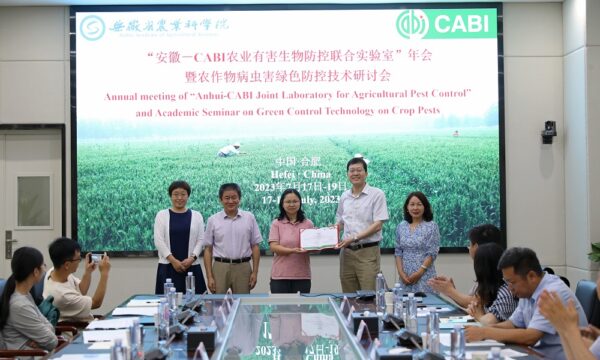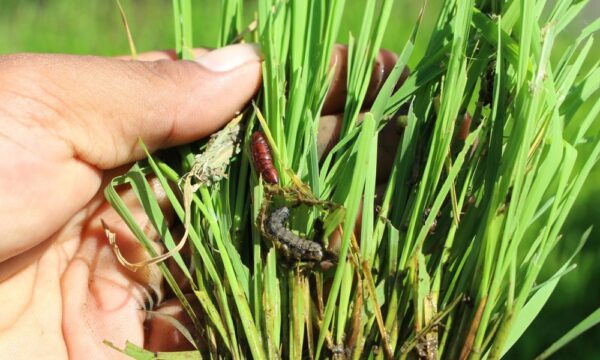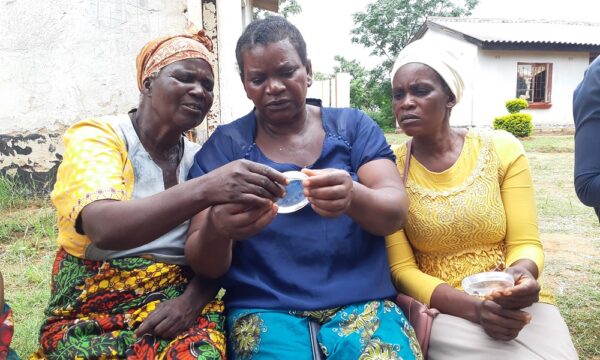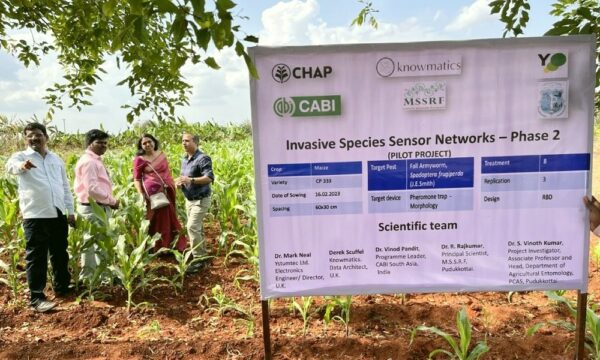by Duncan Barker (Research and Evidence Division, DFID) and Dr Roger Day (CABI). Reblogged from the DFID Research blog.

Global agriculture faces a myriad of threats, of which one of the greatest is invasive species. With no native organisms to control them, invasive species such as plant pests and diseases spread out of control, damaging crops and risking the food security of developing countries.
Take Fall Armyworm, an invasive moth that swept across Africa in 2017 and continued its march into Asia in 2018. It’s estimated that this pest has the potential to cause maize yield losses of approaching 30% across 12 of Africa’s maize-producing countries.
We need to maintain, and preferably increase, crop yields, so we must turn our attention to tackling pests that threaten crop production and plant health. Simply put, when plant health is left unaddressed, development efforts in food security and poverty reduction are diminished.
Prevention is better than cure: building plant health systems
So what can we do?
Early detection and surveillance systems for invasive pests are an important part of tackling the problem. In many development contexts, prevention is far better than cure. Robust systems can detect emerging threats and enable a response that supports small-scale farmers.
In 2011, the CABI-led Plantwise programme — a global network of plant clinics — was launched with DFID funding. Trained plant doctors use the latest knowledge and technology to diagnose pests and invasive species, and provide advice to farmers to help them save their crops and increase yields.
Programmes like Plantwise form a front line for responding to invasive species. CABI has also created a Horizon Scanning Tool, designed to identify potential invasive species before they arrive in-country. A Pest Risk Analysis Tool is in development that enables systematic assessment of risks, providing the basis for prioritising prevention efforts.
Tools like these can form an important part of plant health systems, helping to protect developing countries from invasive species like Fall Armyworm. Government interventions reinforce these systems. In countries like Ghana and Pakistan, CABI’s DFID-funded work with governments has led to the development of invasive species action plans and strategies. We have seen the benefits of this work, helping efforts move from emergency response to planned action.
The importance of evidence in global development
Some might expect DFID to focus its investment on direct interventions such as providing emergency food and supplies. Why do we spend money on systems and researching the spread of invasive species?
The answer is that innovation, research and science play an important part in ensuring we tackle global challenges in a lasting way. Some of the most meaningful development actions we take are based on data and evidence, since they help us understand when and where our efforts deliver the most benefit.
The DFID-funded fall armyworm evidence note, written by CABI in 2017 and updated in 2018, is a case in point. The paper examined the latest information on this crop pest, helping those taking action understand available facts, evidence gaps and preferred interventions.
In Ghana, recommendations made in the evidence note about pesticides were passed onto farmers. Surveys show that government endorsement of recommendations is working and that farmers are now using fewer harmful pesticides. Evidence gives people the knowledge they need to help make informed decisions and tackle the underlying problem (food production) rather than symptoms (hunger).
Furthermore, at a macro level, robust plant health systems can play their part in increasing the volume of marketable produce grown in developing countries. Healthy, safe produce can flow more easily into food supply chains, helping to break down trade barriers and boost economies. Importing countries, like the UK, stand to benefit from this.
DFID support to Plantwise and the Action on Invasives programme are just two examples from substantial research investments in plant health surveillance, diagnostics and response, with a number of research programmes geared to identifying and addressing evolving plant health threats. For example, the Durable Genetic Gains in Wheat programme, draws on epidemiological modelling, surveillance systems and breeding of new resistant varieties to address global future threats to wheat. The West African Virus Epidemiology programme provides disease diagnostics, surveillance and clean planting materials to combat diseases that infect cassava, yams and sweet potato which are the preferred staples for more than 800 million people in Africa.
In a nutshell, evidence-based plant health systems foster an environment of prevention rather than cure and make it easier for developing countries to grow and therefore also trade quality produce, helping development challenges to be addressed at the root.
To keep up to date with the latest Plantwise news, follow @CABI_Plantwise.
Follow @DFID_Research for the latest DFID research news, jobs and funding.
1 Comment
Leave a Reply
Related News & Blogs
Revolutionizing crop protection: Success of a novel approach to combatting fall armyworm in India
The global battle against invasive pests has found a new champion with pioneering efforts to combat the fall armyworm (Spodoptera frugiperda) in India. This is thanks to a sensor-based pheromone trap – that can be operated remotely anywhere in the worl…
18 August 2023





[…] Addressing the root of the problem — why plant health and evidenced-based interventions matter… […]